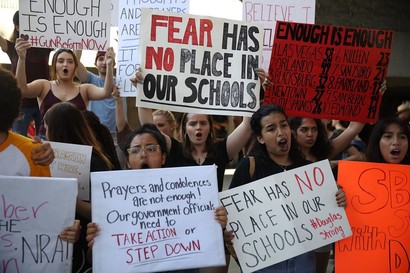 This article originally appeared in Medium. This week, kids and families across the country are preparing for the March for Our Lives, an unprecedented protest to end to gun violence and mass shootings in schools inspired by the incredible advocacy of the students of Stoneman Douglas High School. Although we have witnessed dozens of mass shootings at schools over the past decades, none of these tragedies have resulted in policy change. Experts are saying that this moment feels different. So what is it about the Parkland students that so quickly turned tears, prayers and passion into real change? People around the world have marveled at how “well-spoken” and “eloquent” these impressive young people have been in standing up to Congressmen, and advocating on major news networks. They are the country’s most glimmering example of a silver lining during a turbulent political climate and the aftermath of one of our country’s most tragic school shootings in history. But, the fact that these students are compelling and poised spokespeople is no coincidence. Their teachers have been preparing them to be effective advocates for years. Emma Gonzalez and David Hogg, students at Marjory Stoneman Douglas High School, appear on CNN.According to Broward Schools Superintendent Robert Runcie, the district’s system-wide debate program teaches extemporaneous speaking from an early age. All of the Broward County middle schools, and even some of their elementary schools, have a debate program. Students learn how to argue both sides of an issue, digest differing viewpoints and plead their case. And it’s working. David Hogg, the Stoneman Douglas student who appeared on nearly every major news network in the aftermath of the February 14th shooting, credits the debate program — which he joined on a whim — with preparing him to speak about current events. In fact, just last year the students debated gun violence in their class, and with no time to prepare new arguments Hogg actually relied on his class research to prepare for media interviews. Imagine a world where all young people got this kind of training to be advocates for the causes that they care about. As Bill Drayton, the founder of Ashoka often called the godfather of social entrepreneurship, is so fond of saying, we must be educating young people with the skills – like figuring out ways to solve a problem, organize fluid teams, lead collective action and continually adapt as situations change – to make “everyone a changemaker.” To do that, Drayton says that we have to start young, to instill ownership over problem solving for life. It’s not just students who need to be educated. It’s all of us. Five years ago I set out on a mission to understand one question, “Why do some social ventures succeed and scale, while others don’t?” I poured over thousands of survey results and conducted hundreds of interviews with some of the top changemakers in the country. I kept expecting people to tell me that success is driven by a truly remarkable idea, or by the charisma of the founder, but no one did. Not one. This isn’t to say that factors like charisma, and grit, along with a brilliant idea, don’t contribute significantly to success. But, what I found was that the strategies behind successful social change initiatives — like fundraising, measuring impact and storytelling — are teachable. The problem is that we’re not teaching them. As a result, social change organizations are wasting time and valuable resources learning these lessons on the job when they could be making so much more impact in our communities. As a country, our instinct is to take action when crisis hits — that’s part of what makes America great. But what if we refused to wait for the next tragedy and chose to do a better job of educating people instead? What if like the students from Parkland, we leveraged our preparation and the power of our own lived experience to stand up and change the world? There is no shortage of big problems to solve. We can wait and hope for a sea of courageous voices to emerge, or we can get up and begin educating the next generation of changemakers.
0 Comments
Your comment will be posted after it is approved.
Leave a Reply. |
|
 RSS Feed
RSS Feed